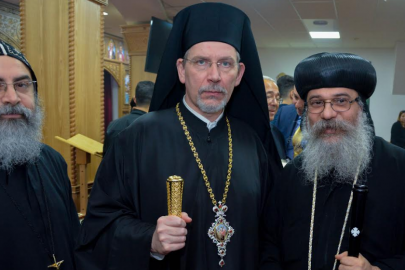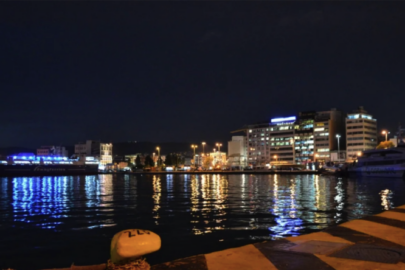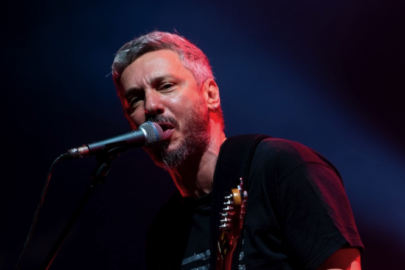Address by His Eminence Metropolitan Cleopas of Sweden at the Conference Entitled Celebrating 40 years of Dialogue: “The significance of Jerusalem in the two faith traditions”
Jerusalem, December 7, 2017
Your All-Holiness Ecumenical Patriarch Bartholomew,
Your Eminence Metropolitan Emmanuel of France,
Your Eminences, Your graces, Rev. Fathers,
Honorable Rabbi Daniel Polish, IJCIC President,
Honorable Rabbi David Rosen, AJC President,
Honorable Rabbis,
Distinguished guests,
I am deeply honored to be in attendance at this seminal conference, in the presence of such a distinguished audience of spiritual leaders and international figures, and to have the privilege of listening to the words of leading voices in the dialogue that has engaged our two faith traditions in a mutual pursuit of peace and love, as well as to have the opportunity to address you now.
As we reflect on the significance of the holy city of Jerusalem in our two ancient faiths, our hearts and minds immediately recall the plethora of Biblical references to the City of the Lord, our beloved Sion, our “city on a hill” that represents all the hopes and aspirations of the people of God.
For example, we might evoke the divinely inspired Psalms, which constitute a common chord of praise to God at our spiritual gatherings, enrichening our worship with their beautiful poetry and profound meaning, or the words of the prophet Isaiah, who proclaims: “Lift up your eyes round about, Sion, and see: your sons shall come from afar, and your daughters shall rise up at your side. The glory of the Lord is risen upon you. The Lord shall arise upon you, and His glory shall be seen upon you. And the kings shall walk in your light, and nations in the brightness of your rising.” (60:4)
I would like to direct your focus, for a few moments, to the Song of Songs, where in the sixth chapter, fourth verse, the author writes: “Καλὴ εἶ, ἡ πλησίον μου, ὡς εὐδοκία, ὡραία ὡς ῾Ιερουσαλήμ,” which in English translates to “You are beautiful, O my love, sweet and comely as Jerusalem.” In the Greek text, the adjective beautiful (καλή) is formed from the word “κάλλος,” which in derives from the verb “καλῶ,” meaning to invite or call. This verb denotes the unique and overpowering quality of beauty to draw or beckon others towards it.
True beauty calls those who love and appreciate it to a desired “μέθεξις” or sharing that vivifies, that overcomes death, because as the verse says, “love is strong as death.” (8:6) Undoubtedly, the fact that this text, which speaks of a love story, was incorporated into the Holy Scriptures in both the Hebrew and Christian Canons, evidences its allegorical meaning; its reference to God’s relationship with His chosen people and the manifestation of his love.
I chose this scriptural passage because of its profound underlying reference to the power of relationships. Allow me to add to this point by quoting from Psalm 26: “Ὁ πατήρ μου καὶ ἡ μήτηρ μου ἐγκατέλιπόν με, ὁ δὲ Κύριος προσελάβετό με”, or in English: “When my father and my mother forsake me, then the Lord will take me up.”
If the foretaste of fullness of life lies in communing or sharing life with someone else, the tendency of our human nature is to adulterate communion into a demand to “possess” the other. As the theologian/philosopher Christos Yannaras notes in his Commentary on the Song of Songs, “the loss of paradise is never a punishment, only a self-exile.” But the instinct to preserve one’s individual self, the urge to appropriate, the thirst for constant self-assurance and self-sustenance threatens the beauty of the life-giving relationship. Only the love of God for His people fully transcends this natural barrier.
Perhaps this is the strongest and most powerful representation of the significance of Jerusalem in both the Jewish and Orthodox Christian traditions – the relationship that it represents between God and the people!
Jerusalem embodies the uniqueness of this relationship. The references to the two Jerusalems – the earthly and heavenly ones – reminds us of the power of this relationship to transcend the physical limitations of our mortal existence and uplift us to a higher state; a divine mode of existence enabling communion with the divine. In addition, we cannot overlook the fact that Jerusalem also represents our peoples’ millennia-old spiritual quest, which sometimes finds them in exile (whether self or other-imposed, whether enslaved in Babylon or victimized by the pharaohs and Herods of their respective era) and other times gratefully back in the bosom of the Holy City. Nonetheless, whether far off in the diaspora or close at hand, each and every one of us can share the nostalgia that wells deep within our heart for a permanent place in the eternal City of the Lord.
These common sentiments and experiences, which characterize the significance of Jerusalem in our two traditions since their inception, have been highlighted during this fruitful and blessed dialogue between us, which has been ongoing for the past forty years – a very significant number in our common scriptural tradition.
Certainly, forty years represents a very symbolic milestone denoting spiritual maturity and preparation. Like Moses, who lived in Egypt for 40 years before coming forth to lead the Israelites after previously attaining the necessary spiritual maturity, these forty years of dialogue have prepared us to further deepen our relationship and bring it to a new level of maturity. Overcoming the slowness of speech and tongue, by the grace of God and blessings that well from within this holy city, we have achieved mutual gains in eloquence during these forty years of dialogue!
Similarly, hearkening to the message of the Prophet Elias, who also typifies the significance and symbolism of the numerical milestone of 40, we have resolved to see the presence of the Lord not in the great and strong wind that was powerful enough even to break the rocks; nor in the blazing fire. It is in the voice of a gentle breeze that our forefathers have taught us to look for the Lord.
Over the next 40 years, we must remember that whatever the challenges that we must face, no matter the trials and tribulations that lie ahead, we must remember that even when we feel abandoned, surrounded by the prophets of Baal… we must remember that the Lord is with us, speaking in the gentle voice of the breeze.
Over the next 40 years, by trusting in God and deepening our bond with him, we can pray and strive to make the voice of this gentle breeze more manifest to the world around us – both in our own spiritual communities, and in our common global village that grows ever smaller and ever-more interdependent by the day.
Over the next 40 years, perhaps like the two protagonists in the Song of Songs, who resemble the comeliness of Jerusalem, we can strive for our hearts to be even more deeply pierced by its true beauty, its “κάλλος,” which constantly beckons us – both those near and far – to it. We can set aside all the individual shortcoming of our mortal existence, which center around us, our ego, and our efforts at self-preservation in the face of those inevitable foes – time and death; and instead, we can lead our lives as those two protagonists immortalized in the Holy Scriptures – giving over ourselves entirely to our fellow man, made in the image and likeness of God, and to the Lord, as His children.
We can overcome the limitations of a communionless individualistic existence and embark on a life-giving relationship with God that will change the mode not only of our existence, but also transform the mode in which our communities and societies exist and operate as well.
Over the next 40 years, the prospects for our dialogue can be to make the unique “κάλλος” of our spiritual relationship with Jerusalem felt all around the world, and to share this experience with others.
The great honor that Hebrew University has afforded the Orthodox Church by conferring an honorary doctoral degree upon His All Holiness Ecumenical Patriarch Bartholomew, spiritual leader of the world’s 300 million Orthodox Christians, also signifies its leadership’s commitment to this ongoing dialogue and your embrace of one of its greatest champions in our time. From the onset of his spiritual journey up to his ascent as head of the Orthodox Church’s senior see, and throughout the 26 blessed years of his inspired spiritual leadership, His All Holiness has committed himself to dialogue with members of other denominations, representatives of other religions, social institutions, and stakeholders from all over the world, examining and collaborating on a plethora of spiritual and social issues.
From the venerable center of Orthodoxy in the Phanar, he has traveled the world, embodying the example of discerning the voice of the Lord in the gentle breeze. Projecting the virtues of patience, forbearance, modesty, and self-sacrifice, he has sought rapprochement and reconciliation, inspired millions through his exemplary polity, and masterfully steered the Church far from the stormy seas and tempests of extremism that often adulterate religion into an instrument of hate and division, rather than a manifestation of love and an invitation to communion and peaceful co-existence.
This symbolic award conferred by Hebrew University to the person of our spiritual father honors the Orthodox Church across the world and highlights the importance of maintaining the dialogue between Christianity and Judaism today. Together with the many similarities, unique challenges, feats and achievements, as well as the common problems shared by the members of our two faith traditions, we have a common duty and responsibility as citizens of the world – each bearing their own unique cultural proposals that have profoundly influenced history and expanded far beyond the geographic areas in which they developed – to further our collaboration and reach new frontiers of mutual understanding and fruitful dialogue.
We are the torch-bearers of two monumental and time-tested traditions that have withstood the test of time and enriched humanity. They have shaped, shape, and will continue to shape history in our common home – the planet earth. We are global citizens of Jerusalem and to our hearts its “κάλλος” speaks.
I leave you with the words of the psalm, which so accurately portray our innermost sentiments: “If I forget you, O Jerusalem, let my right hand be forgotten. Let my tongue cleave to my jaws, if I do not remember you: If I make not Jerusalem the beginning of my joy.” (Psalm 136)
Thank you!





































